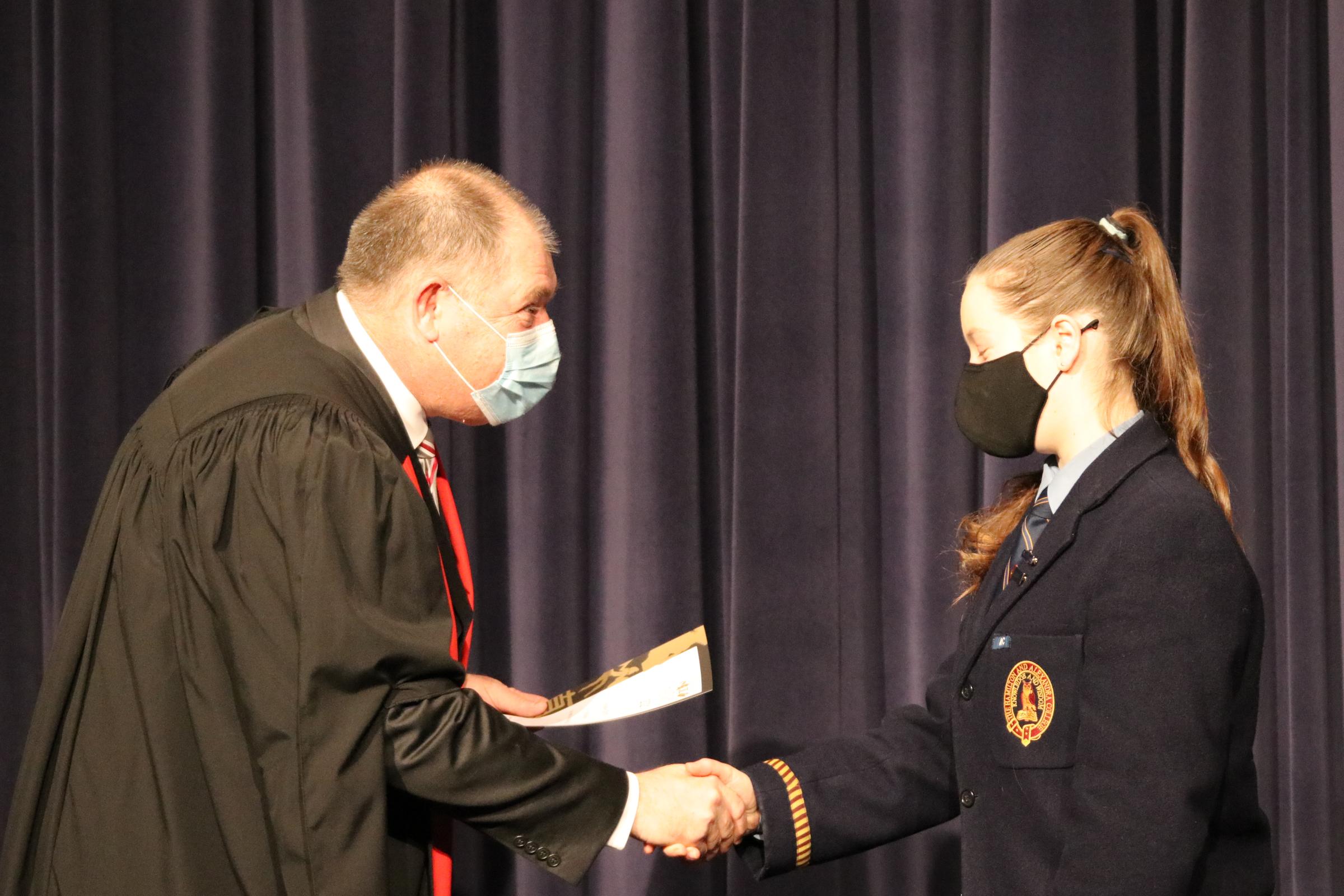Deputy Principal, Teaching and Learning

Celebrate
The Hamilton and Alexandra College continues to promote excellence in teaching and learning. We pride ourselves on our quality Continuous Remote Learning Program which has been refined over the last 18 months and we consistently use technology to enhance the learning experience for our staff and students. For this we have been recognised as finalists in the Australian Education Awards for Best Remote Learning Program.
This week we celebrated learning at our weekly Assembly.
Our teachers and students worked together to showcase some of their achievements in Maths, Science, History and Drama for our Assembly presentation. Ned Walker, a Specialist Maths student in Year 11 helped us all understand how maths is being used to help predict the spread of COVID 19. A team of Maths methods students explored polynomials to model a turtle race and Maddie Green had the honour of reading the turtle race commentary. The Year 11 Biology students drilled down into a recent practical experiment and Lara Rees of Year 8 explained her Science Talent Search Project and concluded that bottled water grew the most bacteria.
Head of Humanities, Mrs Jody Ogle recognised the students who were awarded Credit, Distinction and High Distinction in the National History Competition and Head of Creative Arts, Mrs Bonita Silva highlighted the skills and opportunities offered by studying the performing arts.
One of the questions that we continue to ask is how do we learn how to learn? I recently asked students to provide me with some feedback about their understanding of learning and this is what they told me.
What does it mean to learn?
- Year 10: To gain knowledge but not only that, it is knowing how to learn effectively so you can quickly and easily learn and pick up new skills.
- Year 11: Explore new ideas, creating new navigation paths and find out about myself.
- Year 11: To be provided with all the tools required for a student to fully comprehend a concept in their own time, allowing for everything to "click". Rather than being expected to have understood something in a given period of time.
How do you learn how to learn?
- Year 7: Study! Listen in class! Take notes that you understand!
- Year 8: Every day we are learning new things - not just in school - but I think that everyone has an instinct to 'wonder' and question things. From the questions we want to learn more about an idea and eventually, keep questioning and gathering information until we find an answer.
- Year 10: You learn how to learn by practice and experimenting with what works best for you.
- Year 12: Having interest in what I'm learning.
What has continuous Remote Learning taught you about yourself as al earner?
- Year 8: Not to give myself excuses to stop working.
- Year 8: That as much as the teacher can 'force' or encourage me to do work, my learning and future is up to me. And it relies on me as an individual to be independent and passionate about what I'm learning and how I go about doing it.
- Year 8: I can get distracted easily, and quieter places with nobody around lets me work better, but I am still more distracted.
- Year 9: That I have been taking face to face learning for granted.
Let’s continue to celebrate the wonderful opportunities we have been given to learn in a safe and supportive environment and to use the latest technology with a team of staff who are expert in their subject area.
Learning is not just for school, but for life.
Susan Bradbeer
Deputy Principal of Teaching and Learning
History Competition Results
Exceptional results in the National History Competition!
The Australian History Competition provides an opportunity for our capable historians to shine at a national level and this year our students have done particularly well, with some outstanding individual results and our class average well above the state and national averages. We congratulate all the students for their efforts and they should be very proud of themselves.
The format for several years now has been that Year 7s and 8s sit the same paper, and Year 9 and 10 students sit a Year 10 based paper. Each year level was graded differently, with consideration to what students have covered in their year level curriculum within the school environment. This year’s results showed an overall growth in skillset in the competition analysis.
The study of History extends way beyond facts or recall and at the College we are dedicated to developing each student’s ability to apply critical and creative thinking that focuses on historical skills, including terms, concepts, chronology, knowledge, interpretation, contextualisation and source analysis.
National History Competition results:
High Distinction: Hannah Croft (Year 9) and Lachlan Rees (Yr 10).
Distinction: Phoebe Baker, Hugo Jarrold (Year 7), Emma Donovan, Annabel O’Toole (Year 8) Will Merrin, Catherine Richardson, Alec Watson (Year 10).
Credit: Evie Kennedy, Sophie Rouse, Dougal White, Harry Croft, Lucy Fraser (Year 7) Harry MacDonald, Sophie Merrin (Year 8) Zoe Balog, Neve McClure (Year 9) Lily Bradbeer, Tessa Ingham, Grace MacPherson, Luke Marshall (Year 10).
Merit: Archer Prosser, Jude Hockley (Year 7), Su-Riann Kim, Will Mackellar, Olive Jackson, Amelia Jackson (Year 8) Bella Chow, Fay Harjanto, Zoe Kennedy, Muirne Reilly (Year 9), Chloe Baker (Year 10).
Some of these students will receive their certificates in a House meeting, some will receive them in an upcoming assembly.
Congratulations to all the participants, who did a marvellous job. The skills of History are vital in many other subjects also, and the History Faculty plays an integral role in working with students to develop their analytical and academic abilities at a whole-school level.
Jody Ogle
Head of History
